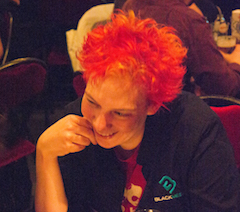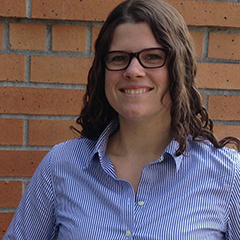This post is part of an ongoing series detailing the new personas that have been drawn up as part of our Drupal.org user research.
Now that we’ve seen real representatives of our Drupal.org user personas, you may be thinking, “these personas are pretty cool, but I’m not sure how they affect me."
Beyond just the obvious applications towards redesigning Drupal.org, any member of our community can use the Drupal.org personas to build better Drupal training programs, tutorials, and Drupal events.

Improving Drupal Training
Cathy Theys is a prominent community member who is known for the hard work she puts in to facilitating Drupal training and sprints all around the world. Some of the problems Cathy has consistently seen revolve around language, and the Drupal.org user personas give a starting point for building more friendly wordage in the community.
"I think that re-using these personas at events can help people identify with whether or not they’re supposed to be in a certain sprint, or which part of that sprint they’re supposed to be in,” Cathy said. “For example, at DrupalCons on Friday, our attendance is probably around 450-500. A great deal of what the mentors do is try and figure out when people are walking through the door, where they should sit down and what they should do.
“In Amsterdam we had some signs identifying the three sprint locations— one of them was the main sprint with topic areas, another was a workshop that showed people the absolute basics — how to use the issue queue and interact with the community— and then there was a sprint that was halfway in-between for people who are set up, who have the tools, but maybe aren’t comfortable working on a sprint issue. That’s the mentored sprint area.
One of the things we planned in advance of DrupalCon Amsterdam was the wording to put on the signs. We wanted to figure out, how does someone identify if that’s the right room for them and if not, what is?"
And when it comes to the personas, Cathy sees the value. “These personas have information that relates to each persona’s amount of contribution and engagement with the community. I can see how that could help out."
Bettering the Issue Queue
 Gábor Hojtsy is another well-known person in the Drupal community, and is currently working as the Multilingual team lead. Like Cathy, he sees the potential for using personas to help build the Drupal community.
Gábor Hojtsy is another well-known person in the Drupal community, and is currently working as the Multilingual team lead. Like Cathy, he sees the potential for using personas to help build the Drupal community.
"I think it would be good to verify that Drupal.org serves these personas. I think that... in a lot of areas in Drupal.org, we serve the Experts and the Masters very well and we don’t serve the rest too well — especially Newcomers. What we do in the Drupal community well is to bring in the Newcomers at events, but we don’t do a good job of bringing in the Newcomers on the site. There’s a lot of text, a lot of things left out of date, a lot of contradicting information — so there’s a lot of space to move downward on this pyramid to serve those people,” he said.
Both Cathy and Gábor recognized how the language can help facilitate improvements to the Drupal project as well — namely, in the issue queues. For Cathy, this often arises when talking to experts in other industries who come in to the Drupal sprints as Learners.
“Right now there is a wording problem, and I think a lot of it revolves around this word novice and how it is misunderstood,” said Cathy. “Sometimes there is an issue in the queue where... for example, a patch is pretty good, but it’s using a deprecated method. So someone has to go find the lines that use the deprecated call and change it to do the newer, better way instead.
"For someone who is an expert at PHP they might feel a little insulted, because they view the task as so easy-- but it lets them focus on learning the actual Drupal contribution workflow. The task itself is simple so that it clears your mind to focus on the things that are new and hard, which are the contribution parts. But if you don’t explain why you’re asking this expert in PHP to do what they might see as menial task, they are insulted and stop contributing."
Gábor has seen the other side of that particular problem.
“People assume if an issue is critical or major, that it would be for Masters only, so they may not even touch that one — but it’s not necessarily true. It would be certainly good to improve the issue queue system to identify better issues for Newcomers and Learners. It’s a lot more difficult, though, because there’s always some sort of domain knowledge required — so the target is not just Skilled in general but Skilled in a specific set of things."
Building Better DrupalCons
When it comes to the biggest Drupal events of all, you can bet that the personas will be used by the planning team.
 “We're at the initial phase of incorporating the personas,” said the Association’s Events Manager, Rachel Friesen. “One way we’ve interpreted the Drupal Association’s goal of "Grow the Community" as it relates to DrupalCon is the idea that we need to bring more Learners to DrupalCon. Specifically, we want them to find DrupalCon accessible, which is why we're trying to find new ways to reach out to welcome first time attendees.
“We're at the initial phase of incorporating the personas,” said the Association’s Events Manager, Rachel Friesen. “One way we’ve interpreted the Drupal Association’s goal of "Grow the Community" as it relates to DrupalCon is the idea that we need to bring more Learners to DrupalCon. Specifically, we want them to find DrupalCon accessible, which is why we're trying to find new ways to reach out to welcome first time attendees.
“Another Drupal Association goal is to "Accelerate the Project,” and we’ve interpreted that DrupalCon’s role in that is by helping increase the number of contributions that are made to the project. To help foster that, we plan to make it easier for our attendees to transition from Learner to Skilled. Part of that means that we need to not only increase number of first time DrupalCon participants, but also remove barriers for new Drupalers to fit in at DrupalCon, make friends, and feel at home in our community.”
 “We’ve been talking about ways to apply these personas,” said Stephanie El-Hajj, the Program Coordinator for the Drupal Association. “Ideally, we bring in Learners, and then they’re tutored and mentored by Experts and Masters. We are seriously looking at using training, summits, sessions and BOFs to move DrupalCon attendees from Learners to Skilled, and using mentoring and sprints to move people from Skilled to Expert and Master.
“We’ve been talking about ways to apply these personas,” said Stephanie El-Hajj, the Program Coordinator for the Drupal Association. “Ideally, we bring in Learners, and then they’re tutored and mentored by Experts and Masters. We are seriously looking at using training, summits, sessions and BOFs to move DrupalCon attendees from Learners to Skilled, and using mentoring and sprints to move people from Skilled to Expert and Master.
“Mentoring and giving back via sprints helps people move through the Drupal learning curve,” Stephanie continued, “with sprinting you’re learning how to do stuff hands on, rather than just looking up an answer or being told how to do something, and you’re applying concepts to projects you maybe didn’t tackle at work. It’s that kind of contributing that helps you grow. And if you have a mentor cheering you on, that’s even better.”
Putting the 'Person' in Persona
Ultimately, user personas are not about Drupal, but are about people: specifically, about helping them learn and grow in the Drupal world.
"I’ve had a lot of different jobs in my life,” said Cathy. "I’ve had a university instructor job, I’ve been a dog trainer, I’ve been a breastfeeding counselor, and all of these different things — and this job that I have right now — involves trying to teach people in a way that respects them for what they already know. The way that you explain things to people is so important to get buy-in and make them feel respected and useful at the same time. So it’s not Drupal specific — it’s all about the humans."

Comments
Putting the "Person" in Persona!
What a great article!
Thanks Leigh. This really puts the previous interviews into perspective. I reckon this would also be useful in the quest for talent. Imagine if there was some quick quiz people could do to see where they are on the Drupal learning curve? We could then point them at resources to go to the next level, but they could also use it as a self-assessment tool. Recruiters could use it to see how much a potential candidate knows too!
"Now that we’ve seen real
"Now that we’ve seen real examples of our Drupal.org persona"
Sorry, I am lost. I guess this article is for real Drupal insiders who are plugged into what is going on,and who consequently know what a 'persona' is. I make a living from Drupal support, and spend many hours a week in the forums writing support posts (is that a recognized persona? I doubt it, though there are a few of us). However, I only occasionally contribute in core issue queues. For relative outsiders like me, as well to real Drupal newbies, a link explaining what personas are in the Drupal context would be useful.
Thanks for your comment!
Sorry, this post was missing top paragraph to provide some context, I now added it. This is the 7th blog post in a serie of posts, which explain what personas are and show examples of real people representing them. If you start reading from the 1st post, you should get enough information.
Great explanation
Thank you for the explanations, I think it is not very clear for everybody. I hope this article could help someone because it is great.
I just stumbled on this blog - GREAT concept, Big Problem
I've done persona work for many years. This is definitely a critical step in building a user centric community. I've been the victim of people with very little exposure immediately trashing a persona and with great arrogance project their completely subjective and ethnocentric insights on the outcome. I cringe at those moments ... so please understand that my critic does not dismiss all the great work accomplished here. However ...
I've been involved with drupal for about 7 years. Started as a volunteer and have made it much more of a career than I ever expected. I've also had some experience with Wordpress and Joomla and they are very attractive in many ways, but there is something about Drupal that has always spoken to me. I'm very passionate about it and want it to flourish, but I keep feeling overlooked by the community. Here's why.
I used to be a developer. Wrote in C, Linux device drivers, etc. This was early in my career, and very intense. Programming was a different ballgame in the 80s. I've since become much more of a project manager with lot's of hands on work which pretty much pegs me as a System Builder. I can write a few snippets of PHP, HTML, CSS, etc. but it is not my thing. I want to plug modules together, build views, rules, panels using the UI. I liken my programming skills to an immigrant who can read and understand english but can't speak it. I get it, but can't write it.
The problem I find in the community is there is little room for me. Often, when I can identify a problem, outline patch, suggest a feature, the response is: Ok, submit a patch, or build it. Often the documentation is written for my grandmother or a coder, but not for me. There are large assumptions about my skillset that could put me in the skilled or expert camp but I will always fall short. Could I even be a Master without coding?
I'm passionate about this, not just for me personally, but for Drupal. I see that Wordpress and Joomla caeter to me both in terms of tools and 3rd party tools/services. I feel like I am their persona and in many respects they are nailing it.
I'm not sure if this is even the right forum to discuss it (if not, please forward or point me to the right place) or if I'm too late and these are baked. Perhaps there is another dimension along side these personas. I'm not presumptuous enough to know the answer, but I definitely feel concerned that something is missing here.
wifikillpro
good working in your Phone & not in Good friend's Mobile using http://www.wifikillpro.com broadband usage for download something or some other nice.